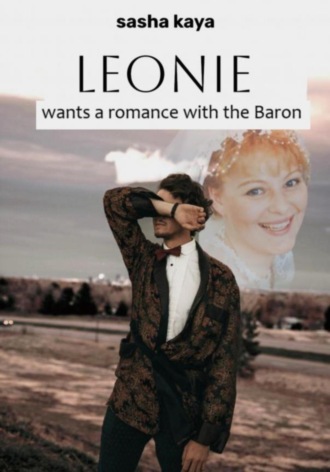
Полная версия
Leonie wants a romance with the Baron

Sasha Kaya
Leonie wants a romance with the Baron
Chapter 1. The Dream
And this is me? I, Leonie Smith, a staunch opponent of monarchy down to the very tips of my hair, suddenly find myself in royal chambers, surrounded on all sides by titled subjects dressed every which way. I look at myself in the mirror – I don’t seem all that different from the crowd: I’m wearing a lavish gown, my hair is piled high and looks like a wig, and a string of precious jewels is pressing down on my neck. What am I doing here?
The crowd parts – I see a young man. I’m seeing him for the first time in my life, yet I instantly understand: he’s the king. Everything suddenly makes sense. This is a dream. A nightmare. There’s only one reason I could be here. I frantically search for the pocket where there should be a sharpened blade or a loaded pistol hidden. Maybe it’s tucked in a stocking? While I’m discreetly trying to peek under the voluminous skirt, some lady stretches out her shriveled hand to me, trembling from the weight of rings and bracelets.
I lift my gaze and realize: I’m the center of attention. Have I been exposed?! No. The gawkers are smiling sweetly, lips pursed. There’s nothing to be done – secrecy above all. I take the old woman’s hand. I’m being led toward the crowned guy. Even better – I’ll seize the moment, and whatever happens, happens!
The bony hand places mine into the firm hand of the young king. I look into the eyes of my future victim… Oh no. Mistake. Now my hand might tremble. He’s smiling, his eyes are radiant, and he looks… harmless. Why do you have to be like this? ! I’m the one who’s supposed to be feared – not the other way around.
“My queen!” says the man beneath the crown, and the word echoes through the hall: queen! Queen! Queen!
And just a little disappointed that I’ll never rule a nation under the gentle gaze of radiant eyes. That’s when I wake up. I’m relieved I’m not in a palace, that I don’t have to kill anyone, that it’s my day off.
Chapter 2. The Tour
“Ladies and gentlemen, welcome to the nineteenth century!”
A group of tourists trails behind the guide. They're hanging on his every word – it’s the very beginning of the tour, and later they’ll all scatter, some even getting lost in the castle. Though it's tucked away from civilization (thirty kilometers to the nearest shop), it remains a popular attraction. Over the years, all kinds of characters have been woven into its history – even ghosts and vampires haven’t been spared. But far more captivating, even after the hundredth retelling, is the story of the baron who lived here fifty years ago. His life bore little resemblance to a classic legend, which probably explains why, thanks to the efforts of enterprising guides, the story has only grown more mysterious with each new version.
Until now, I, Leonie Smith, had kept stopping – now in front of a painting, now a statue – without much desire to keep moving. I felt gloomy and sad. Sad for those who can’t even afford a ticket to visit this castle-turned-museum.
“Follow me!” our guide announced, waving his hand like a French revolutionary.
I liked that. I rushed after him without a care for how ridiculous I might look – after all, we were surrounded by antique furniture, not barricades.
“This room is probably standing empty, and yet twenty homeless people could fit in here,” I said to my mother, who was accompanying me on the tour. “If you took those tapestries off the walls and laid them on the floor, they’d make a better bed than bare earth.”
If anyone had asked those who knew her: What kind of person is my mother? – most would’ve answered without hesitation: a positive person. And it’s true – a smile always seemed to play on Olivia Smith’s face. Even when it wasn’t there, people could easily imagine it. Probably because of the charming dimples in her cheeks and the golden curls on her head.
My father… sadly, he was a whole lot of nothing, and he never really tried to be a dad.Ironically, and true to narrative law, my mother is a serious and quiet person. She’s also kind and, unfortunately, never says no. That’s probably why people came away thinking of her as cheerful – she never left anyone without a kind word. No one walked away from her in a bad mood, even if it cost her her own. And my mother – she’s a single mom, because one day, she didn’t refuse my father his wish for complete freedom – from both of us.
“I won’t buy yogurt. I’ll save up and get rich,” I say, trying to cheer her up even a little. Because yesterday my mom’s unreasonable boss – actually, why just yesterday? She’s unreasonable twenty-four hours a week – and it wears my mom down.
“Get rich, huh?” Mom smirks.
“Well, I read somewhere that someone in America got rich off dairy.”
“I think they went about it a bit differently… Look at that little table. That’s exactly the color I wanted for your bedroom set. The owners of this house must really be proud of it.”
“What’s there to be proud of? Land taken from enemies and gifted to their ancestors along with a title – and they still show it off, waving it around like a badge of honor. They’re so proud, they’ve invented their own code of behavior and decided it’s the standard not just for their circle, but for the world in general – in other words, they’ve placed the rest of us below them.”
He knew full well that the tourists weren’t hanging on his every word because of his brilliant historical insight or captivating storytelling – and he was perfectly fine with that.The guide raised his voice noticeably – clearly aware that Mom and I were getting distracted. We probably shouldn’t stand this close to him, knowing how easily our attention drifts. We’d already been shushed three times by younger women determined to stay close to our young and attractive guide.
“And now, ladies and gentlemen, look to your right!”
As if on command, I turned sharply, nearly bumping into a large vase that stood alone on a narrow pedestal. At that very moment, I was thinking how the money from selling all these precious trinkets could probably feed an entire city—or maybe even a country in Africa. The thought barely had time to form in my head, and I was already dismissing it as silly: after all, objects worth millions of pounds wouldn’t magically change their value just because someone saw a better use for them. Then again, if one imagined passing that vase like a relay baton through the hands of the world’s wealthiest, it could probably raise a decent fortune… for what purpose exactly, I never quite finished thinking. The thought flickered out and vanished.
My eyes landed on a portrait – not as old as the others in the castle, but painted in the best traditions of early 20th-century portraiture. It depicted a handsome man of about thirty, one of the former owners of the estate. A wave of muffled sighs rolled through the crowd of mostly middle-aged women. The guide, nodding in satisfaction, presented the portrait:
“The Eleventh Baron Montgomery – Lord William Owen Colton Landon.”
“What a pompous turkey!” muttered a boy of about ten, earning a gentle tap on the back of his head from his mother.
Back then, I didn’t know that the man’s son – the only heir and current owner of the castle – was standing on the balcony, watching the group of tourists he was obliged to let into his private estate just to keep the place running: the castle, the garden, and all the people working there. He had a tendency to gain weight, though you wouldn’t know it now, because for the past six months he’d been eating nothing but salad for dinner. He had dark, almost black, slightly wavy hair; a moderately sized nose; a small – or rather tiny – mouth that gave him the look of a sulking child; thick, long eyebrows over grey-green eyes; and an open, questioning gaze that made people assume he was guileless – right up until he opened his mouth and shattered that illusion without a shred of sympathy for the deceived.
The young baron’s face held echoes of his ancestors. He looked like he’d stepped out of one of those old portraits. He wasn’t what you’d call handsome, yet I might’ve fallen in love with him at first sight – if I’d known he was the current baron. I didn’t care about his wealth, the respect he got from other aristocrats, or even from queens. The fact that he was an official link between generations made him compelling, romantically mysterious, and detached from the trivialities of everyday life. Through him, I could have fallen in love with eternity.
Chapter 3. The Reason
I, Leonie Smith, was standing on a hill with a good view of the castle. I had put on my most beautiful dress—the only expensive one I owned—bought long ago for my cousin’s wedding banquet. I had worn it only once, but it had reflected many times in the bathroom mirror of my apartment. From the old sideboard I took a wine glass with a long, thin stem. From my mother’s shelf I borrowed a plate from the porcelain set, along with a silver fork, spoon, and knife. I prepared some sandwiches, grabbed a bottle of lemonade, and packed everything—food and tableware—into a wicker basket.
“I raise my glass to you, Baron, and to your wonderful castle!” I declared solemnly, and I truly did raise my glass.
It should be explained here that after that excursion I was head over heels in love with the Baron, even though at the time I still had no idea what kind of person he was, what he looked like, or how old he might be. Since childhood I had known that one day I would marry the master of this castle. In case the master happened to be elderly or already married, I held onto the hope that he would pass on his title to a younger relative, then move to America, open some kind of business there, and live happily ever after, leaving the young couple in blissful solitude. Later, as I grew older, I realized how absurd my fantasies were and invented a new dream: when I married the young Baron, I would turn the castle into a charity center. If living in it proved impossible, I would agree to move into a cozy city apartment with central heating (by that time I had visited enough castles on excursions to know about their inconveniences).
Time went by, I turned twenty, I was well into my higher education, and my monarchist ideas of power were gradually replaced with socialist ones—it was quite possible that I would have forgotten both the castle and its Baron altogether, had the castle not suddenly opened to tourists. I never did meet the Baron to know and love him—both outwardly and inwardly—but the castle… I fell in love with its inner world at first sight. Two years passed, and my reason tells me I am foolish, because I pay money for the tours, which means—to the aristocrats—while I am ever more convinced of the truth of “liberty, equality, and fraternity… and sisterhood.” At the same time, my conscience reproaches my reason for being calculating. Yet my inner voice adds that the art into which aristocrats poured their money is valued even under socialism.
Young people passed by, amused by the strange sight of a girl in a crinoline dress. They began to take pictures of me on their smartphones. At first I smiled, but then they started laughing. So I stuck out my tongue at them in annoyance. They photographed that too.
I imagined that in its better days this place welcomed guests of the highest rank. It was not hard for me to picture how, on a spring afternoon, the Queen’s motorcade kissed the sandy driveway with its tires; how, on a summer morning, elegantly dressed guests and hosts, pinkies raised, sipped tea on the lawn; how, on autumn evenings, warm light filled the windows, broken only by the shadows of figures waltzing at a ball. I had to be a part of that, if only in my nighttime fantasies.
Chapter 4. The Invitation
The guide was once again that same attractive man—in an elegant jacket, with a bow tie and neatly styled hair… He looked as if he were headed to a banquet rather than to meet a group of tourists. He could appeal to anyone—and he knew it. And, wasting no time, he used his charm, flirting with girls who couldn’t care less about the tour itself.
For the fifth time, I ended up in his group. The fifth time—in just two weeks.
“Miss, I’ve seen you here five times already… Maybe it’s time for you to start leading the tours yourself?” he suddenly said and, smiling, flashed his perfectly whitened teeth.
Why is he asking? I’m on vacation, after all. I have every right to be here. Or does he, heaven forbid, think I’m here because of him? …Of course! He thinks I’m chasing after him! What a conceited type!
“Or maybe you’re trying to embellish something?” he added slyly, and I realized he wasn’t just smiling—he was smirking.
I couldn’t reply—the first thought clouded my mind so much I couldn’t focus on anything else. My face turned murderously shy.
Suddenly a lady, at whom the guide had just been trying to make a pass, stepped in for me.
“Come on, John, leave the girl alone! Don’t embarrass her!”
“Oh, not at all,” John spread his hands. “I only meant to offer the young lady a private tour. Including the wine cellar and the attic full of ancient junk—since she should know those aren’t part of the standard program… But if…”
“I’ll go!” I blurted out, surprising even myself with such sudden boldness.
Now it was his turn to freeze. And in the very same instant, I asked myself: why did I just do that? Am I really going to follow this guy through dark cellars and dusty attics?
“Okay, miss. Here’s my card with my phone number. Though… tomorrow at four, I’ll be waiting for you at the main entrance.”
“Four in the morning?” I asked, staring blankly at the card.
“In the evening.”
“But the museum is closed tomorrow.”
“Not for me. I’ll be waiting.”
“You know… I’m actually a student,” I began hurriedly, trying to excuse my impulsiveness by making it sound like all of this was strictly “for work,” but he cut me off:
“Classes tomorrow?”
“No. I’m, you see… writing my thesis… on a topic… well, related to this. And from that perspective, I’m very interested in digging around the cellars… taking a look at the cellars, attics, and everything else up there.”
Chapter 5. The Day Before
My mother works at a travel agency. After classes at the university, which is nearby, I always drop in to see her. If the director happens to be sitting at the desk opposite my mother, I pretend to be a client. The director, as you can imagine, considers me a regular but terribly unprofitable visitor: I waste her time with questions, never buy anything, yet constantly praise her employee. I usually say to her, as if in passing, “Your young employee explains everything so clearly—she’s a true professional!”
And if the director ever dares hint that I shouldn’t come around “just like that” anymore—I’ll write in the complaint book all the things that have been simmering inside my mother for years.
“It’s as hot and stuffy as the jungle. And my brother’s flying in from Africa tomorrow. From Tunisia. And what’s there? The Sahara,” my mother said—not to get an answer, but to test me once again, and, should I not know, to supply the answer herself and add to my store of knowledge.
“He’ll bring us some camels,” I replied without looking up from the newspaper.
In truth, there was nothing of interest in the newspaper. I was thinking about the fact that in just a few hours I would be going on a private tour of the castle halls. Until this very morning, you could have called me one hundred percent my mother’s daughter—from the tips of my hair to the tips of my nails. But that morning I decided: I wouldn’t tell her where I was going tonight. I looked at her smile—the very one she likes to say exists because of me and only for me… and I couldn’t believe that some stranger occupied my thoughts more than the person thanks to whom I live and rejoice.
“Who’s going to win today’s match?” my mother asked.
I answered:
“Mmm?”
She repeated the question, and I suggested:
“Ask the Japanese or the Australians. For them it’s already tomorrow—they’ll definitely know.”
My mother, more than anyone, sensed that I was hiding something. She was about to ask, smiling… but the phone rang. It was her brother from Tunisia.
“How’s the weather over there?… Oh, here it’s hot, not a cloud in the sky! Today I came out in just a shirt… Of course, I brought a coat, but I’m not wearing it now… Yes, yes, it’s so warm you don’t even notice you’re back from vacation.”
By lunchtime the rain had started, a thunderstorm broke out. No surprise—it was late May. Neither my mother nor I, of course, had an umbrella. She wouldn’t let me step outside until I agreed to pull plastic bags over my head and shoes. Bags made of plant-based material—we care about the environment.
The streets of London remained lively: crowds of locals and tourists, freshly dressed in light summer dresses, shorts, and sleeveless shirts. Like us, they hadn’t thought to bring umbrellas.
Amid this colorful mass, I once again thought of my long-standing, faint but persistent desire—to stand out from the faceless crowd. Perhaps very soon…
Chapter 6. The Acquaintance
The main door of the castle was always opened by the butler. At the sound of the bell – deafening, like a gong calling warriors to battle (installed at the insistence of the tourist agency that ran tours here) – the elderly man began his ritual: unlocking every bolt and latch.
One day, having completed this entire ceremony, he found two figures on the doorstep: a young man and a young woman. The girl was dripping wet from the rain. The young man – dry, with an umbrella in his hand, which, apparently, he had not cared to share with her. The girl was me, Leonie Smith.
– “You’ve come to Lord Montgomery, Baron George Gérard Étienne?”
– “We’ve come to George,” replied the guide John, as if all those names belonged to different people and he had just picked the one he wanted.
– “Who else would you come to… The place is as empty as a sinking ship,” the old man muttered under his breath, clearly convinced we could not hear him.
– “I’m from the tour company. My name is John Stevenson. I think he’ll agree to see us once he learns the reason is very important… Confidential, in fact.”
The butler shifted his apathetic gaze to me.
– “She’s with me,” John threw in.
– “Very well. I’ll inform the baron,” the old man said, and was already about to leave, but then turned back, waved a limp hand and added casually: “Make yourselves comfortable…”
John looked around the room – antique furniture everywhere, all with the familiar little plaques: Do not sit, just as in any museum.
– “Um… and where exactly can we?”
– “There. Sit on the nineteenth-century sofa. I keep telling the baron it’s high time to bring in a new one – this piece of museum property looks as though dusting it might cause it to collapse.”
We sat down in silence. A minute or two passed. John was buried in his phone and didn’t move – for a second I even thought he had fallen asleep. What could I say to avoid looking awkward – to sound confident instead?
Конец ознакомительного фрагмента.
Текст предоставлен ООО «Литрес».
Прочитайте эту книгу целиком, купив полную легальную версию на Литрес.
Безопасно оплатить книгу можно банковской картой Visa, MasterCard, Maestro, со счета мобильного телефона, с платежного терминала, в салоне МТС или Связной, через PayPal, WebMoney, Яндекс.Деньги, QIWI Кошелек, бонусными картами или другим удобным Вам способом.






